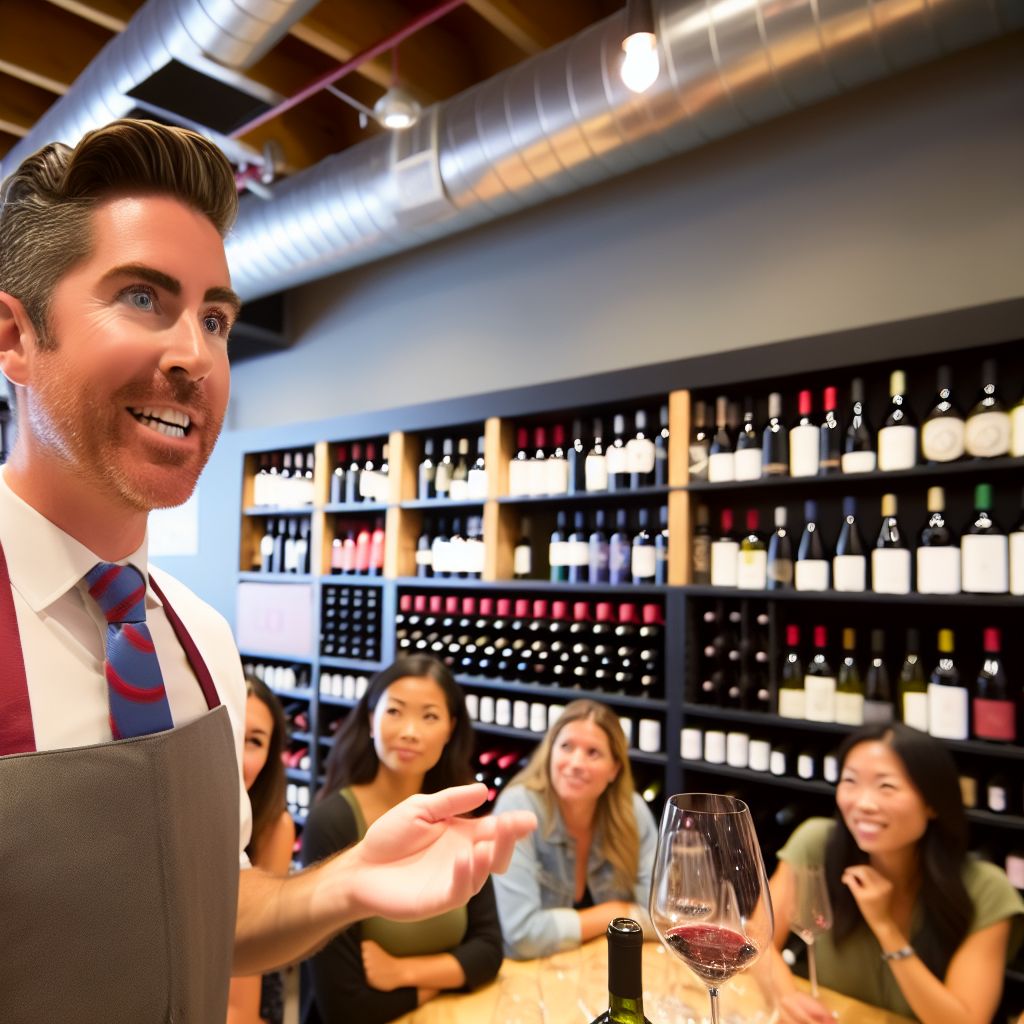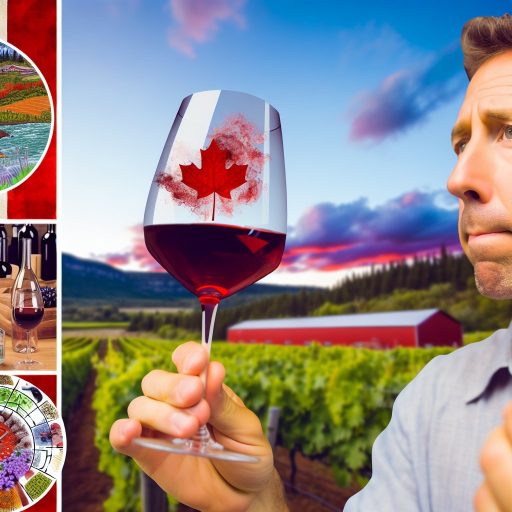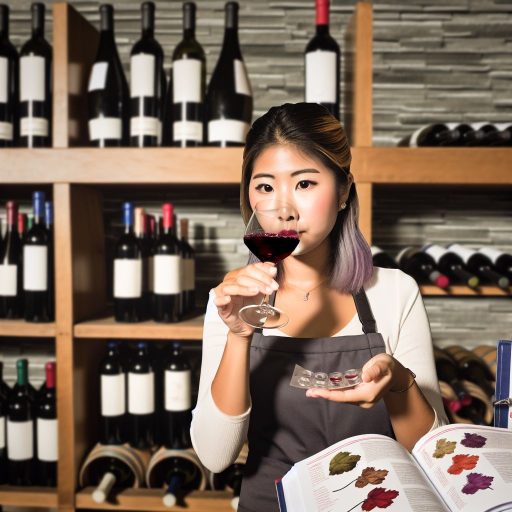The Role of Sommeliers in the Canadian Wine Industry
Expert Guidance on Wine Selection
Sommeliers serve as essential guides in the world of wine.
They possess extensive knowledge of various wine regions and varietals.
Moreover, they understand the nuances of flavor profiles and aromas.
This expertise helps consumers make informed choices.
Many diners rely on sommeliers to enhance their dining experiences.
Furthermore, sommeliers often create wine pairings that elevate meals.
Influencing Consumer Preferences
Sommeliers play a critical role in shaping wine trends in Canada.
They introduce consumers to lesser-known wines and regions.
Additionally, they highlight Canadian wines that deserve recognition.
This exposure helps shift consumer preferences toward local options.
As a result, more diners choose Canadian wines on their menus.
Through their recommendations, sommeliers foster appreciation for unique varietals.
Building Relationships with Winemakers
Sommeliers often collaborate with winemakers to showcase their products.
These relationships can lead to exclusive offerings in restaurants.
Winemakers appreciate sommeliers who champion their wines.
This collaboration enhances the visibility of Canadian wine brands.
In turn, sommeliers gain access to unique selections for their guests.
This synergy benefits both producers and consumers alike.
Educating the Public
Sommeliers take on the responsibility of educating patrons about wine.
They often host tastings and workshops to share their knowledge.
This education builds wine literacy among consumers.
As a result, people become more adventurous in their wine choices.
Additionally, sommeliers clarify the importance of terroir and production methods.
Such knowledge fosters a deeper appreciation for the craft of winemaking.
Embracing Sustainable Practices
Sommeliers increasingly advocate for sustainable wine practices.
Unlock Your Career Potential
Visualize a clear path to success with our tailored Career Consulting service. Personalized insights in just 1-3 days.
Get StartedThey often highlight organic and biodynamic wines to patrons.
This trend aligns with growing consumer interest in sustainability.
By promoting ethical choices, sommeliers contribute to responsible consumption.
Furthermore, they encourage wineries to adopt environmentally friendly methods.
This advocacy supports the broader goal of protecting the planet.
How Sommeliers Curate Wine Lists to Reflect Trends
Understanding the Role of Sommeliers
Sommeliers play a crucial role in shaping dining experiences.
Their expertise helps restaurants build impressive wine lists.
Additionally, they analyze consumer preferences and market trends.
Identifying Emerging Trends
Sommeliers constantly observe emerging wine trends globally.
They attend tastings and industry events to gain insights.
This enables them to select wines that resonate with current interests.
For example, natural and organic wines have gained popularity.
Curating Diverse Selections
Curated wine lists reflect diverse selections to attract diners.
Sommeliers include wines from various regions and styles.
This variety caters to both novice and experienced wine drinkers.
Consequently, restaurants fulfill different customer preferences.
Educating Patrons
Sommeliers take on the responsibility of educating diners.
They provide detailed explanations of wine selections.
Through this education, diners become more adventurous with their choices.
For instance, sommeliers may recommend a lesser-known varietal.
Utilizing Technology and Data
Many sommeliers use technology to enhance their curation process.
Data analytics tools help them track customer preferences over time.
This information informs their decisions when updating the wine list.
Collaborating with Distributors and Producers
Collaboration with wine distributors is essential for sommeliers.
They establish relationships with producers to access unique selections.
This access enables them to offer exclusive wines to their clientele.
Staying Updated with Industry Changes
The wine industry is ever-evolving, and sommeliers must adapt.
They stay informed about regulatory changes and market dynamics.
Through continuous learning, they enhance their expertise significantly.
Promoting Local and Sustainable Options
Canadian sommeliers increasingly prioritize local wineries.
They support sustainable and environmentally friendly practices.
This focus aligns with consumer demand for responsible choices.
Moreover, it strengthens regional wine communities and economies.
The Impact of Sommeliers on Consumer Preferences and Behavior
Role of Sommeliers in Wine Selection
Sommeliers play a crucial role in guiding wine selections for consumers.
They recommend specific wines based on food pairings and personal preferences.
Additionally, they share knowledge about wine regions, varietals, and production methods.
This information can enhance the dining experience for customers.
Shaping Consumer Preferences
Sommeliers significantly influence consumer taste preferences over time.
Their expertise introduces customers to new and diverse wine choices.
For instance, sommeliers often highlight lesser-known wines from emerging regions.
This exposure can lead to changing consumer trends towards those selections.
Building Relationships with Consumers
Sommeliers develop strong relationships with their clientele.
This rapport fosters trust and loyalty among wine drinkers.
Moreover, regular patrons are likely to return for their recommendations.
As a result, sommeliers impact repeat purchases and brand loyalty.
Promoting Wine Education
Wine education is a significant focus for sommeliers in Canada.
They often host tastings and workshops to educate consumers.
These events encourage informed decision-making when selecting wines.
As consumers become more educated, their preferences evolve.
Creating Trends in the Wine Industry
Sommeliers can create and promote wine trends in the industry.
By featuring specific wines on menus, they drive consumer interest.
This attention often leads to increased sales for featured producers.
Consequently, wineries may adjust production based on these trends.
Impact on the Canadian Wine Market
The Canadian wine market is significantly shaped by sommeliers.
They advocate for local wineries, increasing awareness and sales.
Moreover, they often showcase Canadian wines in fine dining establishments.
This support helps elevate the status of domestic wines.
Delve into the Subject: The Future of the Concierge Profession in Canada
Sommeliers as Educators: Workshops and Tastings
The Role of Sommeliers in Education
Sommeliers play a crucial role in educating wine lovers.
They share their extensive knowledge about various wines.
Moreover, they guide consumers in their wine selections.
Through education, sommeliers enhance the overall wine experience.
Workshops Designed for All Levels
Workshops organized by sommeliers target different experience levels.
Beginning wine enthusiasts benefit from introductory sessions.
Advanced workshops delve into complex wine topics.
Each session incorporates interactive elements to engage participants.
Additionally, sommeliers often invite guest speakers to enhance learning.
Wine Tastings as Learning Experiences
Wine tastings serve as practical learning opportunities.
During tastings, sommeliers explain the tasting process.
They often highlight various characteristics of selected wines.
These events foster a deeper appreciation of diverse flavors.
Attendees can ask questions, promoting dialogue and sharing insights.
Creating a Community of Wine Lovers
Sommeliers help build a community through these events.
By connecting attendees, they encourage shared experiences.
Furthermore, these gatherings inspire lasting friendships.
As a result, a supportive wine-loving community flourishes.
See Related Content: Why Sommeliers Are Essential in the Hospitality Industry
Collaboration Between Sommeliers and Local Wineries
Building Strong Relationships
Sommeliers establish strong connections with local wineries.
This collaboration enhances wine quality and reputation.
Wineries benefit from sommeliers’ insights and expertise.
They work together to create unique offerings for consumers.
Curating Wine Selections
Sommeliers curate selections that showcase local wines.
They highlight unique varietals and blends.
This approach increases customer interest in regional products.
Additionally, it fosters a sense of community among producers.
Education and Training
Sommeliers provide education about local wines to patrons.
They conduct tastings that explore regional characteristics.
This educational aspect helps consumers make informed choices.
Consequently, it encourages more people to try local offerings.
Adapting to Trends
Sommeliers remain attuned to emerging wine trends.
They adapt their recommendations based on consumer preferences.
This agility keeps the wine selections fresh and exciting.
Moreover, it drives innovation within local wineries.
Supporting Sustainable Practices
Certain sommeliers advocate for sustainable winemaking practices.
They partner with wineries that prioritize environmental responsibility.
This support extends to consumers who value sustainability.
Hence, this collaboration promotes eco-friendly wines.
Explore Further: How to Master Multitasking as a Concierge

Influence of Social Media and Digital Platforms on Wine Trends
Rise of Social Media
Social media has transformed how consumers discover wine.
Platforms like Instagram and Facebook highlight new trends.
Sommeliers utilize these platforms for broader outreach.
They share personalized recommendations and experiences.
Engagement with Millennial Consumers
Millennials actively seek wine recommendations online.
They value authenticity and relatability in wine choices.
Sommeliers cater to this demographic by sharing engaging content.
They often use storytelling to connect with audiences.
Influencers and Brand Partnerships
Many sommeliers partner with wine brands on promotions.
These collaborations help promote new releases effectively.
Influencers often amplify these efforts through social media.
This creates a buzz around specific wines and regions.
Impact of Online Reviews
Online reviews greatly influence consumer choices.
Sommeliers encourage customers to share their experiences.
Positive reviews can lead to increased sales.
Consequently, sommeliers pay attention to this feedback.
Utilization of Digital Platforms
Websites and apps streamline the wine purchasing process.
Sommeliers recommend using these digital tools for better selections.
These platforms often feature curated lists by experts.
This simplifies decision-making for consumers.
Virtual Tastings and Events
Virtual tastings have become a popular trend.
These events help build community and engagement.
Sommeliers lead these tastings, showcasing various wines.
Participants often share their experiences on social media.
Emerging Trends and Innovations
Social media reveals emerging wine trends swiftly.
For example, organic and biodynamic wines gain popularity.
Sommeliers are quick to adapt to these preferences.
This responsiveness helps shape the market in Canada.
Gain More Insights: Challenges and Rewards of the Casino Host Profession
Sustainability and Organic Wines: A Sommelier’s Perspective
The Rising Demand for Organic Wines
Consumers increasingly seek organic wines in Canada.
This trend reflects broader concerns about health and sustainability.
Somms play a crucial role in guiding customers toward these options.
They educate patrons on the benefits of organic farming practices.
The Impact of Sustainable Practices
Sustainable practices enhance the quality of the vine and the wine.
These methods reduce chemical inputs in agriculture.
Consequently, they foster healthier ecosystems for wine production.
Sommelier Michael Dupont emphasizes the importance of terroir.
He believes that sustainable practices contribute to unique flavor profiles.
Building Relationships with Organic Producers
Somms develop strong ties with organic wine producers.
These relationships lead to better product knowledge and accessibility.
Purchasing directly from producers helps support local economies.
This connection enables sommeliers to curate distinctive wine lists.
Navigating Certifications and Labels
Understanding organic certifications can be challenging for consumers.
Somms guide their clients through various labels and certifications.
They explain differences between organic, biodynamic, and natural wines.
Such expertise helps customers make informed decisions.
Encouraging Sustainable Choices in Dining
Somms also link organic wines to sustainable dining experiences.
They often recommend pairings with local, organic dishes.
This encourages a holistic approach to sustainability.
For example, pairing organic wine with farm-to-table meals enhances flavors.
Challenges Within the Organic Wine Market
The organic wine market faces educational challenges.
Many consumers remain unaware of the benefits and offerings.
Therefore, somms advocate persistently for quality organic options.
They attend tastings and training to stay informed on trends.
Future Trends in Organic Wine Consumption
As climate issues intensify, consumers will demand more sustainability.
Somms will need to adapt to these changing preferences swiftly.
This adaptation includes staying informed about innovative practices.
Ultimately, the influence of sommeliers will shape the future wine landscape.
Future Trends in Wine Selection as Influenced by Sommeliers
Emphasis on Local Wines
Sommeliers are increasingly promoting local wines in Canada.
This shift boosts regional wine economies significantly.
Customers are becoming more interested in wines from nearby vineyards.
Additionally, wineries are responding by enhancing their offerings.
Adoption of Sustainable Practices
Sustainability is gaining attention in wine production.
Sommeliers advocate for wines produced using eco-friendly methods.
Consumers are seeking reliable information about sustainable practices.
This demand is reshaping vineyard management strategies.
Emergence of Virtual Tastings
Technology is transforming wine tasting experiences.
Sommeliers are leading virtual wine tastings for broader audiences.
This trend helps connect wine lovers across different regions.
Furthermore, it allows for education and interaction remotely.
Focus on Diversity and Inclusion
Diversity among wine selections is becoming a priority.
Sommeliers are showcasing wines from underrepresented regions.
This inclusion encourages a richer wine culture in Canada.
Moreover, it attracts a wider range of consumers.
Shift Toward Lower Alcohol Wines
Health-conscious consumers are opting for lower alcohol wines.
Sommeliers are responding by curating selections that meet this demand.
This shift caters to those seeking healthier lifestyle choices.
Consequently, wineries are experimenting with new fermentation methods.
Enhanced Wine Education
Sommeliers are committed to consumer education about wine.
They lead workshops and tastings that deepen knowledge.
This approach fosters a greater appreciation of wine varieties.
In turn, it promotes informed purchasing decisions among consumers.
Additional Resources
Paul Aquino Jr. – Assistant Food Beverage Manager/Sommelier …
Reflections After Two Decades in the Canadian Wine Industry | Del …




